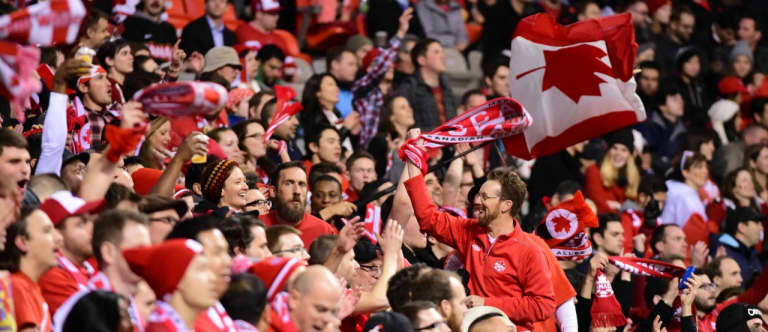TORONTO -- This is a big weekend for soccer in Canada.
That much is at least true in a strictly factual sense: the MLS Cup final is being hosted and played for by Toronto FC; Toronto is in Canada; that makes it a big weekend for Canadian soccer.
Things are not actually that simple. They never are in Canadian sports. While American sports teams usually represent their own markets and surrounding areas, Canadian teams are frequently mentioned by the commentariat as representing the entire country during playoff runs. In basketball and baseball, where Canada does not currently have major league teams outside of Toronto, this point is particularly common; the rhetorical sleight of hand required to turn Toronto’s team into “Canada’s Team” is relatively simple. In soccer, however, Toronto FC is not Canada’s only team—either in MLS or other leagues. That does not prevent TFC from frequently being discussed as if that was the case.
But try telling that to fans from elsewhere in Canada at your own peril.
For foreign viewers, these MLS Cup playoffs have hopefully provided some insight into the nuances of Canadian fandom. To reach this final (Saturday, 8pm ET, FOX, UniMás | TSN, RDS in Canada), Toronto played what might generally be termed a hostile series against its Eastern Conference and domestic rival, the Montreal Impact. How the second leg ended with 11 players on each side will remain one of life’s great mysteries.
There was also no love lost between the respective side’s fans. At BMO Field for the second leg, Toronto’s die-hard supporters erected a banner to mock the Montreal groundskeepers’ struggles to correctly measure the 18-yard boxes in the first leg. It was a great fixture, the kind that livens up the talk of the rivalry between the teams.
In any other context—in a hypothetical series between, say, the Colorado Rapids and Real Salt Lake—you wouldn’t expect the defeated fans to immediately flock to the victor. But this is Canada, and expectations are often different. To hear some Torontonians talk about it, you’d believe all Canadians—even those defeated en-route to the final—have a moral or national obligation to back Toronto FC. Some will. Faced with the choice between a team from Canada and one from Seattle, some ostensible neutrals will choose the side with a maple leaf on their kit. Such choices for one-off matches, however, do not constitute fandom.
Indeed, navigating the complicated definition of fandom is an integral part of supporting a sports team in Canada. Support for the Montreal Impact, Vancouver Whitecaps, or Toronto FC comes with a series of national and cultural dilemmas.

Part of this is simple math: Canada has relatively few teams in most leagues. Consequently, the appearance of a Canadian team in a final is a significant occasion. Toronto FC is indeed the first Canadian men’s soccer team to participate in a top-flight North American final since the Toronto Blizzard were defeated by the NASL’s Chicago Sting in 1984 (In the intervening years, the Vancouver Whitecaps and Ottawa Fury reached finals in lower tiers). It is never a surprise or a remarkable occasion when a major league sports final features an American team, but in Canada it almost always is.
How, then, ought a Montreal Impact or Vancouver Whitecaps fan react to Toronto FC’s MLS Cup final appearance? Cheering for a rival is never easy. It is easiest when one is faced with the choice between two rivals, but that only lets some Whitecaps fans off the hook. For Impact supporters or Canadians who simply don’t enjoy Toronto winning — two groups between which there is considerable overlap — this weekend is not a tremendously joyous occasion.
But still, the Canada question remains. Wouldn’t it be nice, the question goes, if a Canadian team would win just this once? In the abstract, sure. But not all fans are willing to pay that price for seeing a Canadian team triumph. Again, the American analogue is helpful: Would every Timbers fan cheer for the Sounders just to ensure an American team brought home the MLS Cup? Some would, but you wouldn’t bet on them all doing it. Rivalry is complicated and intersectional, which means that fans associations cannot be boiled down to a single variable.
This is still a big weekend for Canadian soccer. The MLS Cup being in Canada is encouraging insofar as it suggests that a Canadian team might one day actually lift the trophy. Just don’t expect all Canadians to want that team to be Toronto FC.












